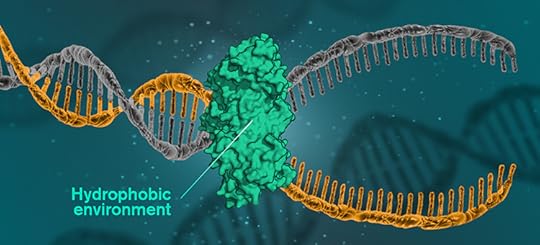Michael J. Behe's Blog, page 427
September 25, 2019
Michael Egnor: Did consciousness “evolve”?
 Michael Egnor
Michael EgnorOne neuroscientist doesn’t seem to understand the problems the idea raises
Darwinian theory could account for non-physical consciousness if consciousness were caused by the brain—that is, if non-physical consciousness were a property of brain activity and thus inextricably linked to brain activity. In that case, the argument is that the brain evolved and consciousness was dragged along because it is linked to brain activity.
In this view, consciousness is an epiphenomenal property of the brain. Epiphenomenalism was first explicitly proposed by “Darwin’s bulldog” Thomas Henry Huxley (1825–1895). If consciousness were epiphenomenal to physical brain processes—as a sort of by-product, like smoke from a steam engine—what evolves is the brain. Does this satisfactorily explain the evolution of consciousness?
The problem with this epiphenomenal view of consciousness is that it renders the mind powerless. If consciousness is merely a property of the brain, it has no agency—no power to cause anything—in itself. Properties can’t do anything. For example, if you hit a nail with a yellow hammer, you hit it with the hammer, not with the yellow. Epiphenomenalism, which is the only framework by which an immaterial consciousness could evolve, asserts that what actually causes us to do things is brain activity. Consciousness is a useless spin-off.
Michael Egnor, “Did consciousness evolve?” at Mind Matters News
And then what becomes of theories based on consciousness, like Graziano’s?
Here’s the earlier article on Michael Graziano’s approach to consciousness: Neuroscientist Michael Graziano should meet the p-zombie. A p-zombie (a philosopher’s thought experiment) behaves exactly like a human being but has no first-person (subjective) experience. The meat robot violates no physical principles. Yet we KNOW we are not p-zombies. Think what that means.
And here is a selection of Dr. Egnor’s articles on consciousness:
In one sense, consciousness IS an illusion. We have no knowledge of the processes of our consciousness, only of the objects of its attention, whether they are physical, emotional, or abstract
Does Your Brain Construct Your Conscious Reality? Part I A reply to computational neuroscientist Anil Seth’s recent TED talk
and
Does Your Brain Construct Your Conscious Reality? Part II In a word, no. Your brain doesn’t “think”; YOU think, using your brain
Copyright © 2019 Uncommon Descent . This Feed is for personal non-commercial use only. If you are not reading this material in your news aggregator, the site you are looking at is guilty of copyright infringement UNLESS EXPLICIT PERMISSION OTHERWISE HAS BEEN GIVEN. Please contact legal@uncommondescent.com so we can take legal action immediately.
Plugin by Taragana
James Tour: 1 hr lecture on OoL
on the mystery of the origin of life:
From the blurb:
Dr. Tour is one of the world’s top synthetic organic chemists. He has authored 680 scientific publications and holds more than 120 patents (here is a partial list). In 2014, Thomson Reuters named him one of “The World’s Most Influential Scientific Minds,” and in 2018 Clarivate Analytics recognized him as one of the world’s most highly cited researchers. Tour is also fearless. He joined more than a thousand other scientists in signing the “Scientific Dissent from Darwinism.” More recently, he has become a thorn in the side of the origin of life research community, offering blunt assessments of the current state of origin of life research. Read more on this controversy here: https://evolutionnews.org/2019/05/pro…Note update in which he apologises for strong language: >>
This lecture has obviously hit a nerve. For Prof. Tour’s response to his critics, see http://www.jmtour.com/wp-content/uplo…. Tour in his response apologizes for using the word “lying” with regard to Jack Szostak, but he goes on to explain in detail why his substantive criticisms of Szostak’s article were correct. To read the criticisms leveled at Tour, see https://stonesnbones.blogspot.com/201…. >>
To focus discussion, I clip a key screenshot:

Food for thought for the fair-minded. END
PS: This follow up interview is also well worth watching:
Copyright © 2019 Uncommon Descent . This Feed is for personal non-commercial use only. If you are not reading this material in your news aggregator, the site you are looking at is guilty of copyright infringement UNLESS EXPLICIT PERMISSION OTHERWISE HAS BEEN GIVEN. Please contact legal@uncommondescent.com so we can take legal action immediately.
Plugin by Taragana
September 24, 2019
If you are not a p-zombie, you should not be a materialist either
 Michael Egnor
Michael EgnorBut don’t tell neuroscientist Michael Graziano, who has set his sights on figuring out consciousness from a materialist perspective. Let it be a surprise:
A p-zombie (a philosophical zombie, as distinguished from the kind that sells movies) is identical to a human being but has no first-person (subjective) experience. It’s a meat robot, so to speak, that is indistinguishable in behavior from a human being. Thus, my p-zombie would look exactly like me, walk like me, talk like me, write blog posts like me, etc.. It would do exactly as I do but it would not have an “I” like me. It would feel nothing and think nothing. It would have no “I” at all. To borrow a concept from philosopher Thomas Nagel, there would be nothing it is like to be a p-zombie.
I’m not concerned here to argue whether a p-zombie is practically possible but rather whether it is conceptually possible. Specifically, does a p-zombie break any physical laws of science?
If a p-zombie is conceptually possible—that is, if it does not violate any scientific principles—then it is reasonable to conclude that whatever gives us first-person subjective experience must be something that is not physical, as the term is understood scientifically. If p-zombies, who lack consciousness, are conceptually consistent with physical science, then consciousness is something outside the purview of physical science.
Michael Egnor, “Neuroscientist Michael Graziano should meet the p-zombie” at Mind Matters News
Here is a selection of Dr. Egnor’s articles on consciousness:
In one sense, consciousness IS an illusion. We have no knowledge of the processes of our consciousness, only of the objects of its attention, whether they are physical, emotional, or abstract
Does Your Brain Construct Your Conscious Reality? Part I A reply to computational neuroscientist Anil Seth’s recent TED talk
and
Does Your Brain Construct Your Conscious Reality? Part II In a word, no. Your brain doesn’t “think”; YOU think, using your brain
Copyright © 2019 Uncommon Descent . This Feed is for personal non-commercial use only. If you are not reading this material in your news aggregator, the site you are looking at is guilty of copyright infringement UNLESS EXPLICIT PERMISSION OTHERWISE HAS BEEN GIVEN. Please contact legal@uncommondescent.com so we can take legal action immediately.
Plugin by Taragana
Have we been wrong about DNA bonds all these years?

For DNA to be read, replicated or repaired, DNA molecules must open themselves. This happens when the cells use a catalytic protein to create a hydrophobic environment around the molecule.Illustration: Yen Strandqvist
Chalmers U Researches say DNA is held together by hydrophobic forces:
Researchers at Chalmers University of Technology, Sweden, have disproved the prevailing theory of how DNA binds itself. It is not, as is generally believed, hydrogen bonds which bind together the two sides of the DNA structure. Instead, water is the key. The discovery opens doors for new understanding in research in medicine and life sciences. The findings are published in PNAS.
DNA is constructed of two strands consisting of sugar molecules and phosphate groups. Between these two strands are nitrogen bases, the compounds that make up genes, with hydrogen bonds between them. Until now, it was commonly thought that those hydrogen bonds held the two strands together.
But now, researchers from Chalmers University of Technology show that the secret to DNA’s helical structure may be that the molecules have a hydrophobic interior, in an environment consisting mainly of water. The environment is therefore hydrophilic, while the DNA molecules’ nitrogen bases are hydrophobic, pushing away the surrounding water. When hydrophobic units are in a hydrophilic environment, they group together to minimize their exposure to the water.
“DNA is held together by hydrophobic forces” at Chalmers University of Technology
Hat tip: Philip Cunningham
Follow UD News at Twitter!
Copyright © 2019 Uncommon Descent . This Feed is for personal non-commercial use only. If you are not reading this material in your news aggregator, the site you are looking at is guilty of copyright infringement UNLESS EXPLICIT PERMISSION OTHERWISE HAS BEEN GIVEN. Please contact legal@uncommondescent.com so we can take legal action immediately.
Plugin by Taragana
Canadians see scientists as elitists, distrust is growing
According to an Ipsos poll commissioned by 3M Canada:
If you have felt a growing sense of distrust in science, you are not alone. This year, the 3M State of Science Index found that people’s skepticism of science is on the rise. In fact, 32% of Canadian adults feel skeptical about science this year, which is up from 25% in 2018.
We know from experience how important science is for the solutions we build. The fields of science, technology, engineering, and math (STEM) are critical for solving the problems that Canada and our customers face. This skepticism of science puts our economy, our pipeline of STEM talent, and our environment at risk.
Richard Chartrand, “Science Centre” at 3M Canada
People who are throwing catfits about this growing distrust might be wise to avoid blaming ID or Donald Trump or whatever pops into their heads next. Look rather at what science has become.
Sure, Jeffrey Epstein. But what about the war on science waged on behalf of political correctness?
People who accept any of that kind of thing have no real message for the rest of us.
Note: 3M Canada’s response has been mere dismay, with no suggestion that it might be useful to ask whether anything has happened recently to cause the erosion of trust.
Sure. That’ll help.
Follow UD News at Twitter!
Copyright © 2019 Uncommon Descent . This Feed is for personal non-commercial use only. If you are not reading this material in your news aggregator, the site you are looking at is guilty of copyright infringement UNLESS EXPLICIT PERMISSION OTHERWISE HAS BEEN GIVEN. Please contact legal@uncommondescent.com so we can take legal action immediately.
Plugin by Taragana
Michael Egnor on Jeffrey Epstein: “Consensus science” meant not denouncing him
Listen to this: People’s lives may depend on other people not speaking out:
Some years ago, at a scientific conference, I had a private chat with a colleague from another university. His research was in a rather obscure topic in biology, but he was a scientist of the first rank. He was a superb investigator, and quite senior and widely respected. He told me that he knew that I was involved in intelligent design, and he thanked me for what I was doing. He told me that he was a Christian. He said that a lot of scientists know that Darwinism is a charade, and he was thankful for scientists who were speaking out, but he couldn’t do so, although he desperately wanted to. He said his wife was sick, and that if he spoke out, he “would never get another grant.” A single public statement endorsing ID or critiquing Darwinism in any meaningful way would make him a pariah for the rest of his life. “My career would end the day I spoke out” he told me. He said that his wife’s life depended on her current medical care, and he would be unable to afford her care if he lost his position. He said he felt terrible that he couldn’t speak out publicly, but he had a responsibility to his family and they would suffer if his career went into the abyss.
Michael Egnor, “Jeffrey Epstein and the Silence of the Scientists” at Evolution News and Science Today:
Dr. Egnor goes on to talk about the ID sympathizers who were hounded from their posts but they probably got off light compared to Epstein’s little girls. Anyway, all of them were old enough to fight. But that said:
The profound revelation from the Epstein scandal is that the scientific community is silent in the face of obvious lies, criminality and moral atrocities. Scientists at MIT and Harvard and the coterie of institutions on whom Epstein rained largesse obviously knew enough about Epstein to know that association with him was immoral and his money probably came from child sex trafficking (they could know with a mouse click that Epstein had no college degree and sketchy experience in finance — his primary enterprise seemed to be making little girls available to rich men), but they stuck with the consensus and said nothing. Their scientific careers came first.
Michael Egnor, “Jeffrey Epstein and the Silence of the Scientists” at Evolution News and Science Today:
Does it have anything to do with the idea that the mind is an evolved illusion and morality is just an adaptation that gets us to replicate our selfish genes?
Those could turn out to be expensive beliefs. We can only hope that someday they will mainly be expensive for those who believe them, not for others.
We were also told recently that universities are now grappling with issues around donor behavior:
Almost a month after the jail suicide of the disgraced billionaire financier, the fallout continues for those who had accepted his gifts, especially when they were given after Epstein served time for soliciting sex from a minor in 2008. MIT, for instance, has pledged to hand over the $800,000 it received from Epstein to charity, while two of its academics have resigned in protest of their boss’ relationship with the donor. Harvard University, on the other hand, has so far resisted calls to redirect the $6.5 million or so it received.
The Epstein case is the latest controversy to shine a light on the way that universities solicit and accept money from wealthy individuals, foundations, and companies. Many institutions across the world have found themselves in the firing line over their own links to other controversial individuals or corporations. So, how do they decide whose money to accept and when to reject or return funds? And are they more conscientious now than in the past?
David Adam, “Universities Grapple with Donor Behavior” at The Scientist
A real risk in these times is that it will all become politicized. But it is better to try and fail than…
Accused sex trafficker Jeffrey Epstein (1953-2019) and the science world fallout
Science pros reckon with the fallout from Jeffrey Epstein – and it’s grim Rogers asks, “How did these geniuses find themselves cozying up to a child rapist?” and provides us with some of the many answers that will filter in.
Darwinists May Be Paying A Price For Pop Science Celebrity: Jeffrey Epstein
UD Newswatch: Epstein suicide
Now Steve Pinker Is Getting #MeToo’d, At Inside Higher Ed Over Jeffrey Epstein
Alleged Sex Trafficker Jeffrey Epstein Pledged $30 Million For Harvard Evolution Program
and
Jeff Epstein’s cultural dumpster fire spreads to ID vs. evo controversies. Just because people are in the news doesn’t mean they did anything. It rather shows how a bad actor can change the news picture.
Follow UD News at Twitter!
Copyright © 2019 Uncommon Descent . This Feed is for personal non-commercial use only. If you are not reading this material in your news aggregator, the site you are looking at is guilty of copyright infringement UNLESS EXPLICIT PERMISSION OTHERWISE HAS BEEN GIVEN. Please contact legal@uncommondescent.com so we can take legal action immediately.
Plugin by Taragana
September 23, 2019
C.S. Lewis on intelligent design
Reminiscing: A trailer for the 2013 book, The Magician’s Twin worth watching in its own right.
Excerpts Three-part documentary.
Hat tip: Ken Francis, co-author with Theodore Dalrymple of The Terror of Existence: From Ecclesiastes to Theatre of the Absurd
Copyright © 2019 Uncommon Descent . This Feed is for personal non-commercial use only. If you are not reading this material in your news aggregator, the site you are looking at is guilty of copyright infringement UNLESS EXPLICIT PERMISSION OTHERWISE HAS BEEN GIVEN. Please contact legal@uncommondescent.com so we can take legal action immediately.
Plugin by Taragana
Jonathan Bartlett: Can computers simply evolve greater intelligence, Avida-style?

Jonathan Bartlett The Avida program seems to have demonstrated the opposite:
… if they [the Avida researchers] didn’t develop the exact right environment, nothing complex evolved. Now, the interesting part is that, if they say that the environment must be a specific type in order for the organism to evolve, that is another way of saying that the environment must be designed. In other words, far from proving that design is unnecessary, they merely shift the design to another part of the system.
This is consistent with Bill Dembski’s notion of displacement. Put simply, to develop complex functional systems, you can shift design around but you can’t actually get rid of it. The original Avida program simply shifted the design of the organism to that of the environment. As the paper itself said, if the environment was not properly designed, the organism didn’t evolve the traits needed for survival. (More detailed information here.) Another interesting aspect of Avida is that, despite the researchers’ claims that design has been avoided, every Avida organism contains designed code.
Jonathan Bartlett, “Can computers simply evolve greater intelligence?” at Mind Matters News
Further reading: Can we evolve self-driving cars? The new method may be an advance but thinking of it as “evolution” at work risks misconceptions
and
Could one single machine invent everything? (Eric Holloway)
Copyright © 2019 Uncommon Descent . This Feed is for personal non-commercial use only. If you are not reading this material in your news aggregator, the site you are looking at is guilty of copyright infringement UNLESS EXPLICIT PERMISSION OTHERWISE HAS BEEN GIVEN. Please contact legal@uncommondescent.com so we can take legal action immediately.
Plugin by Taragana
Eric Holloway: Can free will be a scientific idea?

Yes, if we look at it from the perspective of information theory:
So, if all of our universe could, in principle, be run on a smartphone, then every part of the universe could certainly be run on a smartphone, including the human mind. This is why many highly educated and intelligent people think that the mind itself must reduce to a computer algorithm, at least in theory. In their view, there is just no other possibility.
However, their assumption is provably false. There are other possibilities. Chance and necessity are a very narrow restriction on the range of possibilities. They are a very successful restriction because we’ve been able to explain and control much of our world by reducing it to models of chance and necessity. But the point remains that chance and necessity is not the only way things can be.
Why not? To understand what the phrase “chance and necessity” means, we need a brief detour through probability theory. In everyday life, we casually throw around the terms “confidence,” “chance,” and “likely.” We sometimes attach numbers too. We say that an event has a 90% chance of occurring. But, what do we mean by a “90% chance”?
There are several ways of interpreting our notion of a 90% chance and they do not all mean the same thing.
Eric Holloway, “Can free will really be a scientific idea” at Mind Matters News
Further reading on free will:
Why do atheists still claim that free will can’t exist? Sam Harris reduces everything to physics but then ignores quantum non-determinism (Eric Holloway)
Was famous old evidence against free will just debunked? The pattern that was thought to prove free will an illusion may have been noise
and
Younger thinkers now argue that free will is real. The laws of physics do not rule it out, they say.
Copyright © 2019 Uncommon Descent . This Feed is for personal non-commercial use only. If you are not reading this material in your news aggregator, the site you are looking at is guilty of copyright infringement UNLESS EXPLICIT PERMISSION OTHERWISE HAS BEEN GIVEN. Please contact legal@uncommondescent.com so we can take legal action immediately.
Plugin by Taragana
Researchers: The Neanderthals might have died out from ear infections
From ScienceDaily:
“It may sound far-fetched, but when we, for the first time, reconstructed the Eustachian tubes of Neanderthals, we discovered that they are remarkably similar to those of human infants,” said coinvestigator and Downstate Health Sciences University Associate Professor Samuel Márquez, PhD, “Middle ear infections are nearly ubiquitous among infants because the flat angle of an infant’s Eustachian tubes is prone to retain the otitis media bacteria that cause these infections — the same flat angle we found in Neanderthals.”
In this age of antibiotics, these infections are easy to treat and relatively benign for human babies. Additionally, around age 5, the Eustachian tubes in human children lengthen and the angle becomes more acute, allowing the ear to drain, all but eliminating these recurring infections beyond early childhood.
But unlike modern humans, the structure of the Eustachian tubes in Neanderthals do not change with age — which means these ear infections and their complications, including respiratory infections, hearing loss, pneumonia, and worse, would not only become chronic, but a lifelong threat to overall health and survival.
“It’s not just the threat of dying of an infection,” said Dr. Márquez. “If you are constantly ill, you would not be as fit and effective in competing with your Homo sapien cousins for food and other resources. “In a world of survival of the fittest, it is no wonder that modern man, not Neanderthal, prevailed.”Paper. (paywall) – Anthony Santino Pagano, Samuel Márquez, Jeffrey T. Laitman. Reconstructing the Neanderthal Eustachian Tube: New Insights on Disease Susceptibility, Fitness Cost, and Extinction. The Anatomical Record, 2019; DOI: 10.1002/ar.24248 More.
It’s getting to the point where a quality broadcasting group could make a palatable film series about the Neanderthals. Now that we are long past the Ooga! Ooga! thing.
A deathbed scene… including the discovery that a daughter has eloped with one of those others…. !
See also: Neanderthal Man: The long-lost relative turns up again, this time with documents
and
A deep and abiding need for Neanderthals to be stupid. Why?
Follow UD News at Twitter!
Copyright © 2019 Uncommon Descent . This Feed is for personal non-commercial use only. If you are not reading this material in your news aggregator, the site you are looking at is guilty of copyright infringement UNLESS EXPLICIT PERMISSION OTHERWISE HAS BEEN GIVEN. Please contact legal@uncommondescent.com so we can take legal action immediately.
Plugin by Taragana
Michael J. Behe's Blog
- Michael J. Behe's profile
- 219 followers



